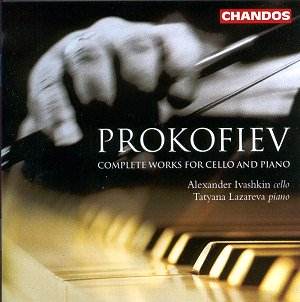Alexander Ivashkin has made a number of notable recordings
for Chandos, of composers such as Schnittke, Tcherepnin, Gubaidulina
and Roslavets as well as Prokofiev. He is a naturally lyrical player,
his beautiful, burnished sound being particularly apt for Prokofiev’s
aching melodies (he plays a 1710 Guarneri). It would appear that this
is Ivashkin’s second traversal through Prokofiev’s cello music, for
there is a recital on Ondine CDMANU1517 with pianist Tamas Vesmas.
The programme starts with the longest (and possibly
most popular) piece, the 1949 Sonata for Cello and Piano. Of course
Rostropovich is duty bound to appear in the catalogues (as do many others),
but Ivashkin manages to stamp his own personality on the piece. The
sonorous solo opening bodes well, as well it might: and there is much
to admire to come. Ivashkin’s most impressive trait is his innate lyricism
(the episodes in the second movement, Moderato, sing for all they are
worth), and it is much exercised in this piece. The devilish technical
difficulties are subsumed in the overall sweep of the performance (the
climax of the first movement consists of manic cello arpeggios against
ecstatic piano chords: ten minutes in). The young pianist, Tatyana Lazareva
(born 1977) seems supremely talented in her role as accompanist, sensitive
and evocative when required; strong and forthright when called for,
also.
One does not need perfect pitch to realise that the
ensuing Ballade is in C minor: all the anger and anguish of that
key is contained in the piano’s opening dark and strong chordal flourish.
The active, rhythmic elements come alive here but the overall impression
is that one can simply immerse oneself and get lost in this beautiful
outpouring.
The other hefty work Ivashkin presents is the Sonata
for Solo Cello, which ends the disc. It is the last piece that Prokofiev
began in 1952, and he did not live to complete it, leaving only sketches
for a first movement. This completion, by Vladimir Blok, was first performed
in 1972 by Natalia Gutman. It is a haunting piece which suites Ivashkin’s
expressive bent perfectly (but he captures the spirit of the more capricious
sections expertly, too). This is a gripping twelve minutes, and a wonderfully
thought-provoking close to the disc that will linger long in this listener’s
memory.
The three items that precede the Solo Cello Sonata
are gems. The Adagio from Cinderella is eloquence personified.
Its gentle and rarefied world coming through not only because of Ivashkin’s
phrasing but also because of Lazareva’s tonal variety. There is some
superb stopping, and the climax is highly expressive and passionate
(as befits the climax of the ballet). The Andante from the Cello Concertino
is all but operatic. Ample contrast is afforded by the five excerpts
from the ballet Chout, which contain much of the characteristic,
spiky and (in the third) cheeky Prokofiev.
It is, indeed, difficult to find fault with this disc
on any level. The recording is exemplary. A truly superb achievement
from all concerned.
Colin Clarke
